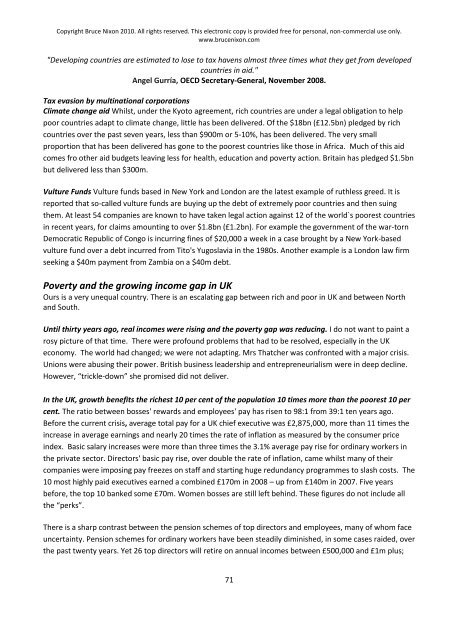A better world is possible - Global Commons Institute
A better world is possible - Global Commons Institute
A better world is possible - Global Commons Institute
You also want an ePaper? Increase the reach of your titles
YUMPU automatically turns print PDFs into web optimized ePapers that Google loves.
Copyright Bruce Nixon 2010. All rights reserved. Th<strong>is</strong> electronic copy <strong>is</strong> provided free for personal, non-commercial use only.<br />
www.brucenixon.com<br />
"Developing countries are estimated to lose to tax havens almost three times what they get from developed<br />
countries in aid."<br />
Angel Gurría, OECD Secretary-General, November 2008.<br />
Tax evasion by multinational corporations<br />
Climate change aid Whilst, under the Kyoto agreement, rich countries are under a legal obligation to help<br />
poor countries adapt to climate change, little has been delivered. Of the $18bn (£12.5bn) pledged by rich<br />
countries over the past seven years, less than $900m or 5-10%, has been delivered. The very small<br />
proportion that has been delivered has gone to the poorest countries like those in Africa. Much of th<strong>is</strong> aid<br />
comes fro other aid budgets leaving less for health, education and poverty action. Britain has pledged $1.5bn<br />
but delivered less than $300m.<br />
Vulture Funds Vulture funds based in New York and London are the latest example of ruthless greed. It <strong>is</strong><br />
reported that so-called vulture funds are buying up the debt of extremely poor countries and then suing<br />
them. At least 54 companies are known to have taken legal action against 12 of the <strong>world</strong>`s poorest countries<br />
in recent years, for claims amounting to over $1.8bn (£1.2bn). For example the government of the war-torn<br />
Democratic Republic of Congo <strong>is</strong> incurring fines of $20,000 a week in a case brought by a New York-based<br />
vulture fund over a debt incurred from Tito's Yugoslavia in the 1980s. Another example <strong>is</strong> a London law firm<br />
seeking a $40m payment from Zambia on a $40m debt.<br />
Poverty and the growing income gap in UK<br />
Ours <strong>is</strong> a very unequal country. There <strong>is</strong> an escalating gap between rich and poor in UK and between North<br />
and South.<br />
Until thirty years ago, real incomes were r<strong>is</strong>ing and the poverty gap was reducing. I do not want to paint a<br />
rosy picture of that time. There were profound problems that had to be resolved, especially in the UK<br />
economy. The <strong>world</strong> had changed; we were not adapting. Mrs Thatcher was confronted with a major cr<strong>is</strong><strong>is</strong>.<br />
Unions were abusing their power. Brit<strong>is</strong>h business leadership and entrepreneurial<strong>is</strong>m were in deep decline.<br />
However, “trickle-down” she prom<strong>is</strong>ed did not deliver.<br />
In the UK, growth benefits the richest 10 per cent of the population 10 times more than the poorest 10 per<br />
cent. The ratio between bosses' rewards and employees' pay has r<strong>is</strong>en to 98:1 from 39:1 ten years ago.<br />
Before the current cr<strong>is</strong><strong>is</strong>, average total pay for a UK chief executive was £2,875,000, more than 11 times the<br />
increase in average earnings and nearly 20 times the rate of inflation as measured by the consumer price<br />
index. Basic salary increases were more than three times the 3.1% average pay r<strong>is</strong>e for ordinary workers in<br />
the private sector. Directors' basic pay r<strong>is</strong>e, over double the rate of inflation, came whilst many of their<br />
companies were imposing pay freezes on staff and starting huge redundancy programmes to slash costs. The<br />
10 most highly paid executives earned a combined £170m in 2008 – up from £140m in 2007. Five years<br />
before, the top 10 banked some £70m. Women bosses are still left behind. These figures do not include all<br />
the “perks”.<br />
There <strong>is</strong> a sharp contrast between the pension schemes of top directors and employees, many of whom face<br />
uncertainty. Pension schemes for ordinary workers have been steadily dimin<strong>is</strong>hed, in some cases raided, over<br />
the past twenty years. Yet 26 top directors will retire on annual incomes between £500,000 and £1m plus;<br />
71
















